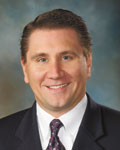July 1, 2013
Sandwiched, Part 3
 By David W. Deuth, CFSP
By David W. Deuth, CFSP
President, Weerts Funeral Home
The previous two articles in this series have ties to the “Sandwich Generation:” those who are sandwiched between caring for a parent (or other relative) and caring for (or financially supporting) their children.
As more and more Americans find themselves in some form or facet of the Sandwich Generation, they are finding themselves pulled in all kinds of different directions at the same time. The potential for unintended consequences looms large, as so many things clamor for their time, attention and resources.
Last month, we looked briefly at the scenario of a son or daughter who comes to the funeral home to “pre-plan” for their parent, who is under hospice care and the time is near. All the funds have already been expended to pay for extended skilled nursing care. Months previous, they were instructed to cash in the cash-value life insurance and use the proceeds to pay the nursing center before Medicaid (Title XIX) could kick in.
As a consequence, because they didn’t know what they didn’t know, every opportunity they had to use their parent’s own money for their funeral expenses came and went without so much as a tiny red flag. After all, everything at home was still moving at 100 miles an hour, more responsibilities had been added at work, and the kids still needed help with their homework…AND someone still had to oversee everything for mom or dad at the care center.
We understand that most people aren’t eager to discuss pre-planning. Or, even think about it. And we certainly understand that “life happens,” with countless demands of one’s time, attention and finances.
Does this mean that everything is doom and gloom?
It sure doesn’t have to be.
Following are a few important things to consider that can go a long way in helping to develop – or update – some critical elements of your overall plan:
1. Establish a Will. It will provide clarity to your family – and the probate court – of your intentions for your assets and belongings.
HELPFUL TIP 1. Review and update EVERY FIVE YEARS or anytime birth, death, marriage, divorce affect your immediate household.
HELPFUL TIP 2. Review and possibly update your will when you move to another state.
2. Establish a Durable Power of Attorney. This document will empower someone you trust to act legally on your behalf if you are unable to do so.
HELPFUL TIP: Several copies of this document may become necessary. Never give away your only copy!
2. Establish a Durable Healthcare Power of Attorney. This document will empower someone you trust to make medical decisions on your behalf if you are unable to do so.
HELPFUL TIP: Consider placing a copy in your medical file with your primary medical doctor.
HELPFUL TIP: The person(s) empowered to act should have their own copy of this document.
4. Consider Establishing a Living Will and/or Advance Directive. These documents allow you to state what types of medical treatment you do – or don’t – want, and under what conditions.
HELPFUL TIP: Consider placing a copy on file with your primary medical doctor.
5. Review your life insurance. Make certain your death
benefit coverage is adequate. And make certain your beneficiaries are accurate and up-to-date.
HELPFUL TIP 1. Review and Update EVERY FIVE YEARS or anytime Birth, Death, Marriage, Divorce
affect your immediate household.
6. Establish a file at the funeral home you prefer. Record your personal information as well as your preferences for your funeral/memorial service.
HELPFUL TIP: Let your family know of your funeral home preference.
7. When assisted living and/or long term care enters the picture, schedule another appointment with your funeral home. Proper planning will enable the use of mom or dad’s own funds to pre-pay funeral expenses before those same funds are completely exhausted to pay for the ongoing health care bills.
HELPFUL TIP: Remember, a properly established, pre-paid funeral account is safeguarded – even if you’re on Title XIX – to pay the funeral-related expenses for which it was established.
But, like most things, there is a catch:
You have to establish that pre-paid funeral account before the funds run out.
Now that we’ve concluded this 3-part article series, do you have some questions? We’ll be honored to visit with you over a cup of coffee – without cost or obligation – to answer any questions that we can. Of course, some of your planning
questions will certainly be reserved for your legal counsel, which we highly advocate.
Because if your planning doesn’t do what you need it to do when you need it to do what you GOT it to do, it’s about like having no plan at all. So if you “Plan Well,” you’ll go a long way in helping the people you care the most about to “Remember Well.” We’ve found that to be a Good Plan.
Remember Well.
Tags: Cash Value Life Insurance, Cfsp, Critical Elements, Doom And Gloom, Facet, Funeral Expenses, Hospice Care, Important Things, Many Things, Medicaid, Nursing Center, Pre Plan, Probate Court, Red Flag, Sandwich Generation, Skilled Nursing Care, Time Attention, Title Xix, Unintended Consequences, Weerts Funeral Home
Trackback URL: https://www.50pluslife.com/2013/07/01/sandwiched-part-3/trackback/


